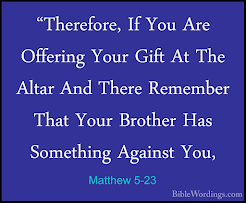 |
| Jesus eats with sinners and publicans by Alexandre Bida |
Some personal reflections by Terry McCann
Catholics are taught that when the priest at mass says the words of consecration: take and eat, this is my body, this is the cup of my blood of the new covenant; do this as a memorial of me - that the priest is representing Christ who is really present in our midst, eating and drinking with us who are gathered "in his name."
My mother converted to Roman Catholicism so that my dad and she could get married in the Catholic Church. She died in January of the year that I would turn six years old. In December of that same year my dad married again - this time he married a non-Catholic divorcee. It is not surprising that he married again relatively quickly. I have been given to understand that I was something of a 'handful', with behaviour problems and temper tantrums. It must have been incredibly brave of my stepmother to marry my dad, given the baggage represented by the five year old brat that he brought with him. I found out later that, immediately after the wedding service at Manning Road Methodist Church in Durban, one of my aunts (second cousin 1x removed) said to my new mom, "Of course, you must realise that you are not really married in the eyes of the Catholic Church." This left my mom hurting and angry. In all their married years, I have no recollection, other than with one exception, that they ever stepped foot in a Catholic church. Nor did they ever again communicate with that side of the family. I met that aunt at my dad's funeral. She was a stranger to me and had to introduce herself.
In his Apostolic Exhortation, The Joy of Love (Amoris Laetitia), Pope Francis writes:
It is important that the divorced who have entered a new union should be made to feel part of the Church. “They are not excommunicated” and they should not be treated as such, since they remain part of the ecclesial community. These situations “require careful discernment and respectful accompaniment. Language or conduct that might lead them to feel discriminated against should be avoided, and they should be encouraged to participate in the life of the community." - AL 243.
Many of us know how that went down. A small but vocal contingent of fervent Catholics, led by some bishops, accused the pope of sowing discord and confusion in the Catholic Church. Sin is sin, they say, and adultery is sin and should be called as such.
We also know from the gospels how Jesus felt about sinners, and about religious people. He called the tax collector, Matthew, to be a disciple and then joined in the party Matthew gave to his friends, eating and drinking with other tax collectors and sinners. See Matthew 9:9-13. This shocked the pharisees who were fervent, religious and meticulous about keeping the law. And yet it was to the scribes and pharisees that Jesus gave his sternest warnings: Woe to you, scribes and pharisees. See Luke 11:37–54 and Matthew 23:1–39.
It is very dangerous for us to judge who should be 'in' and who should be 'out'. Let's not go down that road. Our call is simply to love. As a general rule, the ones who most need our love are the most vulnerable people, and those who feel least loved. Our Lord call us to serve these with love, respect, justice and joy.



